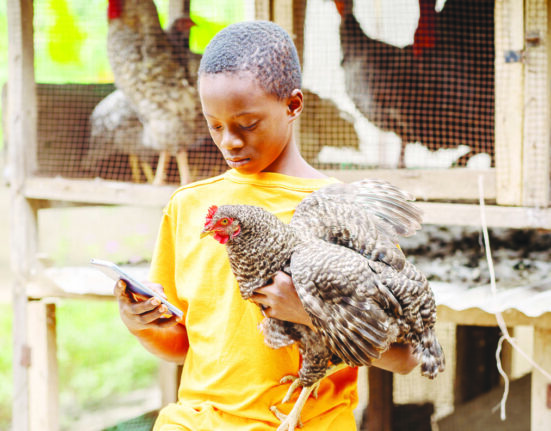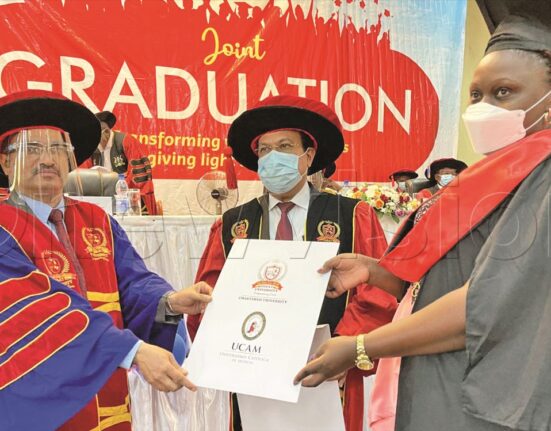This articles was first published in the New Vision on January 3, 2021
As the country keeps schools and higher institutions of learning closed to stop the spread of COVID-19, about 60% of the universities countrywide have been cleared to teach online. However, to ensure that there is proper learning, the Government has sent teams to all its universities to ascertain how they are handling lecturing and assessment. Sources from the education ministry note that the team is also seeking proposals from universities on how the re-opening for all the other students can be handled.
In the meantime, the executive director of the National Council for Higher education, Prof. Mary Okwakol, wrote to all universities, informing them that she was in receipt of a communication from the First Lady and education minister, Mrs Janet Museveni, informing her that universities will have to remain closed for the next three months.
“Based on the advice of the Presidential Scientific Advisory Committee, the President (Yoweri Museveni) has guided that all higher institutions of learning should continue studying online using the ODEL (Open and Distance E-Learning) system for at least three months. This is so as to enable Government find a lasting solution,” the letter read.
This communication is in tandem with Mwalimu analysis and prediction that schools and higher institutions of learning may not open soon as anticipated, and that the earliest time of full re-opening could be in March or April.
All reports and experts’ views from the Government indicate that the recall of lower classes will, at the earliest, probably be in a month or two; unless the Government gets a quicker solution to the COVID-19 puzzle.

Are universities ready?
So many universities and institutions of higher learning are suddenly thrust into an unplanned, unwanted and fraught challenging experiment in online learning with the COVID-19 pandemic.

For many of those participating — institutions of higher education, lecturers and students, online learning is not what they desired, but it is what they are stuck with for now. How should they proceed?
As of today, the National Council for Higher Education shows that only 60% universities have been cleared to lecture online. Of the 51 licensed and chartered universities, only 31 have been cleared to lecture and examine students online. This is a slight improvement from the 50% as by October last year. There are a handful of other tertiary institutions which have been cleared to conduct online lectures and assessment.
Some universities were already up to speed and were lecturing and assessing students online. Such universities include the International University of East Africa, Ndejje University, Uganda Christian University Mukono, Victoria University and ISBAT University.
The vice-chancellor of Ndejje University, Prof. Eriabu Lugujjo, says the university is on good course for online teaching and assessment of students.
“We just have to get used to this kind of lecturing as of now. We are in a situation where we have to keep the students learning and lecturers’ livelihood protected. We have to keep lecturing online in this case,” Prof. Lugujjo explains.
He, however, proposes that the new entrants need to be cleared by the Government to report to the university and get oriented before they can begin online learning.
Prof. Lugujjo also appeals to the Government to come up with a deliberate plan to ensure that students get cheaper internet to use in the course of learning.
At Kyambogo University, the vice-chancellor, Prof. Elly Katunguka, says studies on ODEL started on January 18 this year and ended on January 30.
“Students were supposed to report for face-to-face lectures on February 1 to February 14, then sit for their final examinations from Monday, February 15 to 18, this year, to mark the end of Semester II 2019/2020.”
The university, for the first time in its history, is planning to conduct an online session for the new students (freshers).
According to the university’s academic registrar, Alfred Masikye, the orientation was to run from Monday to February 6, and it will be done online. The change of courses will also be done online, from February 1 to 12.
However, following Prof. Okwakol’s letter, Katunguka said the face-to face sessions have been called off and that students will keep studying online.
This is the same case with Makerere University, which had already set re-opening days for its students. The university had revised its initial plan to re-open on Sunday (January 30). But with the notice from the NCHE, that means it could remain closed to non-finalists, at least for the next three months.
However, the vice-chancellor, Prof. Barnabas Nawangwe, following last week’s visit to the institution by First Lady and Minister of Education and Sports Janet Museveni and state minister Dr John Chrysostom Muyingo, has now written to the minister suggesting a phased re-opening of the university.

In his proposal, he wants Makerere University to adopt blended learning. Blended learning, also known as hybrid learning, is when traditional classroom teaching is combined with online learning and independent study. Nawangwe says this arrangement will allow students to have more control over the time, pace and style of their learning.
“Under this arrangement, students will come to the university in shifts; with each group staying for a month and undergoing intensive training, including practical work where applicable,” he said in his letter.
He adds that the rest of the teaching will be done online and students will also be recalled to the university, in shifts, towards the end of the semester to do examinations.
Victoria University is also set to use blended learning for its students; as it awaits full re-opening. Currently, all teaching and assessment are done online at this University.

Similar proposals are being fronted by several other universities, to find a way of reviving the operations of universities; other than entirely depending on online teaching.
Other universities, such as the International University of East Africa, have also resumed teaching online.
However, their greatest concern is the slow internet and the inability to access some social media applications following the recent blockade in the country.
Challenges

Some students in universities with huge numbers, such as Makerere and Kyambogo, have been struggling to effectively teach online. This is because the big number of students cannot easily be monitored on online platforms for lectures and examinations.
Some students are also not happy with the arrangement. Their argument is that it is costly to study online and that most of the universities have not reduced their fees.
A student at Uganda Martyrs’ University Nkozi says the online learning would have worked if only universities could reduce fees for the students.
“We still pay the same amount we were paying before the institutions were closed,” she says.
Some students at Makerere University Business School say it is possible to study online and graduate. Joan Linda says she managed to sit for her end of semester examinations and hopes that she will be able to graduate, come March this year.
Makerere university managed to get its continuing students to do end of semester examinations in shifts. However, the complexity, the university says, is ensuring that they resume their studies.
Some students at Makerere University missed the end of semester examinations since they were not able to pay tuition on time. Annet Acungwire says her parents had been laid off from work and could not pay. She has, however, started an appeal process to see if the university will allow to have a special arrangement for end of semester examinations.
What government says
The state minister for higher education, Dr John Chrysostom Muyingo, says the higher institutions of learning will have to remain closed till the Government deems it fit for them to open.
“COVID-19 is still a problem. But as Government, we are focused on ensuring that there are all possible ways we can keep students accessing education. This is why we are asking the universities to keep teaching online.”
He acknowledged that there are still tricky issues of accessing internet and gadgets for students.
“We will work to a level of ensuring that there is better infrastructure to enable online learning in the country. Our appeal to universities and students is for them to persevere as we think of other alternatives of handling the situation,” Dr Muyingo explained.
Compiled by Conan Businge









Leave feedback about this